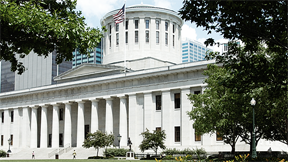

Archive
Broadcast
About



A SERVICE OF OHIO'S PUBLIC BROADCASTING STATIONS
A SERVICE OF OHIO'S PUBLIC BROADCASTING STATIONS
Program Directory

OHIO SUPREME COURT JUSTICES:
Paul E. Pfeifer (Acting Chief Justice)
Evelyn Lundberg Stratton
Maureen O'Connor
Judith Lanzinger
Terrence O'Donnell
Robert Cupp
GUEST SPEAKERS:
Dean Alan C. Michaels
E. Gordon Gee
Judge Robert M. Duncan
Chief Justice Christine Durham
Judge Sheila Farmer
Barbara J. Howard, Esq.
Nancy Rogers, Esq.
Members of the OSU Glee Club (Musical Interlude)
Stephen Anway, Squire, Sanders & Dempsey, former clerk to Chief Justice Moyer
Steven C. Hollon
Dr. Richard Ellsworth, Pastor Emeritus, Central College Presbyterian Church
Chief Justice Moyer died unexpectedly on Good Friday, April 2,
2010, at age 70. He was planning to retire at the end of the year
after 24 years of service as the head of the Ohio Judiciary, and
he was the dean of the national community of Chief Justices,
having served longer than any of his peers. With his untimely
departure, we were deprived of many more years of leadership
in service of the cause of improving the administration of
justice. We know this because Chief Justice Moyer had given
every indication that he would be active in retirement,
supporting further reforms of the judicial system. We know also
that he would have been effective in these efforts because he
was so very effective in every other area of his career.
Chief Justice Moyer served in numerous national leadership
positions, including president of the Conference of Chief
Justices (CCJ), chair of the CCJ Task Force on Politics and
Judicial Selection, and co-chair of the CCJ Committee on
Emergency Preparedness in the Courts. He also served as vice
chair of the Advanced Science and Technology Adjudication
Resource Center, a national consortium to prepare judges for
managing the resolution of disputes that present complex
science issues, and he was on the board of Justice at Stake.
But this was a man who cared not for titles and chairs except
insofar as they were a means to the end of making the world a
better place. It is indisputable, that he did this.
Among the judicial reforms and improvements witnessed these
past three decades in which Chief Justice Moyer played a part
are:
¿ The rise of alternative dispute resolution in the
U.S. as a routine and viable judicial tool.
¿ The enhanced professionalism of judging
with increased and standardized training and
continuing education.
¿ The criminal sentencing reform movement.
¿ The national move toward greater public access
and transparency in court proceedings.
He also worked with lawyers and judges in other countries in
the development of independent judiciaries. He helped draft
the Constitution of Ukraine and also worked with judicial
leaders in China, Korea, Argentina, and Chile.
Of course, his contributions were due to his possession of
the usual requirements for success: a tireless work ethic,
a gifted intellect, and a creative mind. But ultimately the
accomplishments of Thomas J. Moyer the Chief were made
possible by the character of Tom Moyer the man, soft spoken
and humble, courteous and kind, always conscious of others
and concerned for the greater good.
So, as we reflect on a remarkable judicial career, let us be
reminded that greatness of deed is not possible without
greatness of character.
This piece originally was printed in Judicature, a publication of the American
Judicature Society. Chief Justice Moyer received the American Judicature
Society Herbert Harley Award in 1989 for his contributions to improving the
administration of justice in Ohio.
May 1, 2010


